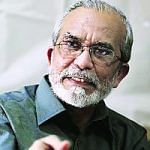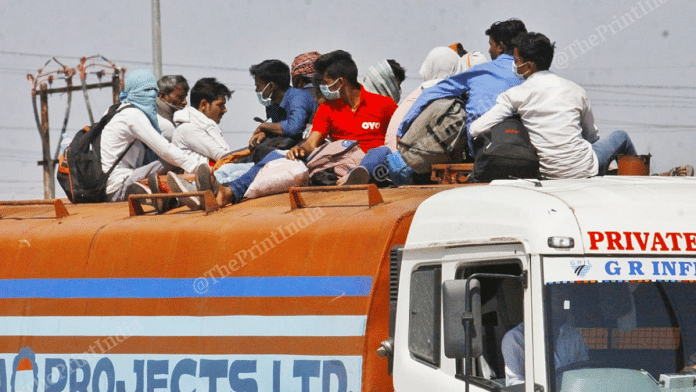 An eerie quiet: At the stroke of midnight on March 24, India suspended ‘politics’
An eerie quiet: At the stroke of midnight on March 24, India suspended ‘politics’
Suhas Palshikar | Political Scientist
The Indian Express
Palshikar argues that the coronavirus crisis “will also leave its imprint on the idea of the public and our politics”. He argues that whatever happened pre-corona has slowly been erased — the NPR being “postponed”, detentions in Kashmir slowly coming to an end, scandals around the judiciary are forgotten and most importantly “all economic disaster will be blamed on the virus”. He lists three things required for a “new politics” — deliberation between the “government and Opposition, between Centre and states; between experts and the administration and even between the Union and state administrations”; secondly, he emphasises on the need to spend more on regular budgets, in times of such health crisis and third, he pushes for a better understanding “between economic inequality and suffering during such a crisis.”
 The markaz in Nizamuddin has thrown light on a malaise — and a challenge
The markaz in Nizamuddin has thrown light on a malaise — and a challenge
Najeeb Jung | Former civil servant
The Indian Express
Commenting on the markaz (centre) of the Tablighi Jamaat at Nizamuddin, which is now a coronavirus hotspot and has led to at least six deaths, Jung states that while the markaz is culpable and should be punished accordingly, “It was also incumbent on the local administration to have been more aware and enforce an early evacuation.” He notes that “today’s Indian Muslims suffer from an intellectual paralysis,” with the madrasa system being extremely outdated. He argues, “The task, once again, is to rethink Islam without completely breaking from the past.” Quoting poet Allama Iqbal, Jung recommends approaching “modern knowledge with a respectful but independent attitude and to appreciate the teachings of Islam in the light of that knowledge.”

A pandemic in an unequal India
Harsh Mander | Human rights worker, writer and teacher
The Hindu
Mander argues that all steps taken by the government in its fight against coronavirus “place the responsibility on citizens, a majority without privilege, to fight the virus.” Listing all those the government has left unaccounted for in its nationwide lockdown plan, Mander asks, “how can we justify the choice of a strategy which throws the dispossessed, who lack all of the above, to both hunger and infection?” Pointing out the irony of India’s coronavirus reality, he says, “A pandemic has been brought into India by people who can afford plane tickets, but while they will buy private health services, the virus will devastate the poor who they infect and who have little access to health care.” He also suggests solutions that will protect India’s vulnerable — “Pensions must be doubled and home-delivered in cash. There should be free water tankers supplying water in slum shanties throughout the working days. Governments must double PDS entitlements.”
 India must act now to protect its health workers
India must act now to protect its health workers
Ravindra M. Mehta | Chief of pulmonary and critical care medicine at Apollo Hospitals, Bengaluru
Hindustan Times
Mehta emphasises the importance of Personal Protective Equipment for health workers to combat the coronavirus pandemic . He argues that “an adequate supply of PPE is the foundation to defeat the virus”. He recommends five solutions to meet the high PPE demand — “An emergency PPE law must be enacted for production, distribution and utilisation”, a central distributing system with “military precision”, auditing of Covid-19 centres to ensure there are no “short-cuts for PPE/personnel”, educating the public about the importance of PPE and “innovative measures such as mask reuse (with appropriate sterilisation in low-infectivity areas), cloth masks, and bodysuits”.
 The sudden return of quantity planning in the wake of covid-19
The sudden return of quantity planning in the wake of covid-19
Niranjan Rajadhyaksha | Niranjan Rajadhyaksha is a member of the academic board of the Meghnad Desai Academy of Economics
Mint
Rajadhyaksha draws a parallel between World War II and the coronavirus pandemic in terms of the economic impact. He argues that just like a war, the economic crisis is all about quantities. He notes,”The war against the covid-19 pandemic is very different from the military war” but perhaps a lesson can be drawn from British economist John Maynard Keynes’ work. “Keynes essentially argued that the main challenge was not how to finance the war effort, but how to manage real resources to produce the arms that the UK needed to defend herself”, explains Rajadhyaksa.
 Can we stop the clock?
Can we stop the clock?
Neelkanth Mishra | Managing Director, the India Strategist and Co-Head of Equity Strategy, Asia Pacific, for Credit Suisse.
Business Standard
Mishra comments on the economic impact of the coronavirus pandemic. He argues that “If some private firms can afford to pay even the reduced wages, they may choose to do so, but this may also need an early promise of stronger future growth in the form of a large growth stimulus that keeps their hopes intact.” He argues, “Interest payments, which total about Rs 10 trillion a year in the banking system (and likely another four to five trillion in the non-bank financial system) are man-made, but hard to deal with at a system level.”
 Contagion quandary: To globalise less or more
Contagion quandary: To globalise less or more
Sanjay Kirloskar | Indian industrialist and the chairman of the Kirloskar Brothers Ltd
Business Standard
Kirloskar comments on the border restrictions resulting from the coronavirus pandemic. “It is a watershed moment for the world, and companies must reimagine the way they build supply chains and develop markets”, explains Kirloskar. He says, “The open-ended fear of uncertainty is creating psychological and material scars on companies across the world, which will have consequences for globalisation” but the world will need to overcome it. He argues that “In the modern world, globalisation is both a necessity and an inevitability.”
Today’s Editorials
Hindustan Times: HT comments on Nizamuddin’s Tablighi Jamaat. It notes that the local authorities and the organisers of the gathering were highly irresponsible. The incident also underlines why it is important to focus on high-risk clusters and is also a cue for Indian health authorities to aggressively expand testing.
The Indian Express: The lockdown has given the government a chance to offer ‘state-sponsored’ memories in terms of re-telecasting Ramayan and other such programmes. As the coronavirus crisis puts the state capacity on test, Ramayan, Mahabharat and Upanishad Ganga may be just the coping mechanism Indians need, Express argues with a pinch of sarcasm.
With inputs from Unnati Sharma




Why pension should be doubled specifically during lock down we are restricted to roti kapada makan that to only roti as new cloths not required.